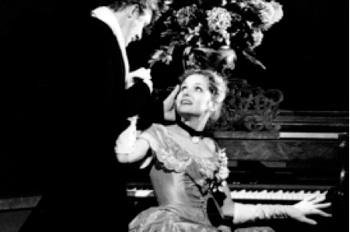Elsewhere






✭✭✭✭✩
by Harold Pinter & Di Trevis, directed by Di Trevis
National Theatre, Cottesloe Theatre:
November 23, 2000-February 7, 2001
Olivier Theatre:
February 23-April 4, 2001
When at the box office picking up my tickets for HAMLET, I would just ask since I was there if there happened to be any tickets to Pinter's latest work, REMEMBRANCE OF THINGS PAST. I expected to hear "No" and walk off since I had been told over the phone that the first six weeks of the play were completely sold out. To my great surprise, the woman at the box office said there were two restricted view seats available for the day after the world première. I did not hesitate! The seats were in the second balcony of the Cottesloe Theatre. The view was "restricted" only if one sat back and let the balcony rail be in the way. A slight lean forward and everything was fine. The balcony was perfect for this play because we could better enjoy the intricate blocking patterns that director Di Trevis had created.
As some may know, this play is the stage adaptation by Trevis and Pinter of Pinter's famous but never filmed screenplay from 1977 of Marcel Proust's mammoth seven-volume novel (1913-27). I am not normally a fan of adaptations of novels into plays. Too often the language is pedestrian and the adaptor is too concerned with trying to fit in all the famous bits. This adaptation was completely different. Hopeless as it would be to fit all the action of the work into a mere three hours, Pinter and Trevis were clearly presenting the play as one man's impression of the novel.
This solution meshes perfectly with the impressionism of the novel where image leads on to image. Pinter's minimalist style, where the surface conveys volumes more of subtext, causes the three hours of the play to have the resonance of an epic work. The production itself is gorgeous, one scene dissolving into the next. This is facilitated by an open playing area and the elegant use of chairs and tables to set up simultaneous scenes. One sequence of scenes that epitomizes the whole play is when a friend of Marcel's wife alternately affirms and denies his suspicions about her. This sequence, like the play itself, suggests that people are both interconnected and unknowable at the same time.

Duncan Bell is excellent as the tortured, enigmatic Swann, whose fate seems a precursor of Marcel's. David Rintoul makes the horrid Baron Charlus seem pompous, foolish, depraved and dangerous all at once. Indira Varma is suitably beautiful and sphinxlike as Marcel's beloved Odette. Diana Hardcastle is hilarious as the Duchess de Guermantes, who seeks to outdo everyone in artistic sensibility. And I could go on so vivid are these small portraits.
By the end we felt we had seen a writer, director and cast accomplish the impossible in so elegantly capturing the essence of Proust's great work.
©Christopher Hoile
Note: A version of this review appeared in the London Theatre Guide 2000-12-31.
Photo: (top) Duncan Bell as Charles Swann and Fritha Goodey as Odette de Crecy; (bottom) Sebastian Harcombe as Marcel. ©2000 Catherine Ashmore.
2000-12-31


London, GBR: Remembrance of Things Past






